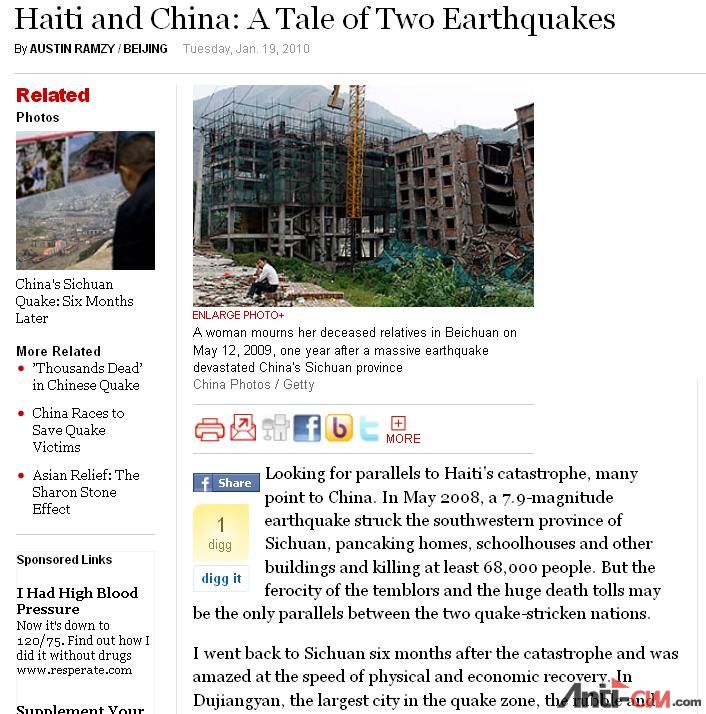|
|
From Time.
For the detail, pls click:
http://www.time.com/time/world/article/0,8599,1954644,00.html
Looking for parallels to Haiti's catastrophe, many point to China. In May 2008, a 7.9-magnitude earthquake struck the southwestern province of Sichuan, pancaking homes, schoolhouses and other buildings and killing at least 68,000 people. But the ferocity of the temblors and the huge death tolls may be the only parallels between the two quake-stricken nations.
I went back to Sichuan six months after the catastrophe and was amazed at the speed of physical and economic recovery. In Dujiangyan, the largest city in the quake zone, the rubble and tent cities had disappeared. The jumble of debris was replaced by piles of new bricks, lumber and other construction materials. There was a building boom across the region, and dozens of temporary villages were erected to house the 5 million people who were rendered homeless by the quake. The prefab housing was made out of blue aluminum siding lined with Styrofoam insulation. It had concrete floors and was arranged in neat rows in flat spots at the bases of the mountains. Conditions weren't luxurious, but the camps were clean and the housing dry and fairly warm.
I found no evidence of homelessness, though there were reports of people in the mountains who refused to spend their rebuilding funds and chose to remain in tents. "When you compare this to the tsunami and other major disasters, it's rare to see something so efficient take place. It was well organized and well planned. All the international people who came in spoke very highly of this," says Ramsey Rayyis, regional representative for the American Red Cross in China.
China has several advantages over Haiti when it comes to reconstruction. While China's disaster affected millions of people, the destruction was concentrated in rural areas and smaller towns, not a dense city. The mountainous parts of Sichuan and surrounding provinces hit by the 2008 quake are poor, not destitute, and they all had a basic level of food and water supplies, access to medicine and health care, and transportation and communications infrastructure. When much of that was wiped out by the quake, China's central government responded quickly, sending tens of thousands of soldiers and paramilitary troops to the region. They freed trapped survivors, delivered food and water, rebuilt roads and ensured stability. I witnessed no incidents of looting or other lawlessness when I was there in the days immediately following the quake. While there were safety concerns because of landslides and aftershocks, there was no danger of violence. "You do have a strong central government, a government that's able to support the people, and I think that makes a difference," says Rayyis. "Whereas in a place like Haiti, that's going to be a struggle. You're going to need a lot more external intervention."
With such speedy reconstruction, there are obviously questions about the quality of building. At the same time, there has been an intense focus on controlling graft. Despite allegations that corruption led to the shoddy construction of schools in the first place, China hasn't punished anyone for any wrongdoing that occurred before the earthquake. Grieving parents who protested over the deaths of their children in collapsed schools were silenced by payments and by threats of punishment if they continued their agitation. Officials have declared that the extent of the destruction was due to the intensity of the temblor, not substandard buildings. But the government has taken a hard line on misuse of rebuilding funds, and a handful of people have been punished. While the size of rebuilding efforts means that there will inevitably be some graft, the extent of official and unofficial scrutiny means it is one of the riskier places in China to skim funds.
In 2008 the government said it would spend $176 billion on reconstruction by 2011. (The total recovery cost is estimated at $250 billion.) As of last June it had already spent more than $50 billion. Some of the expenses have been shouldered by other parts of China. Twenty provinces have set aside 1% of fiscal revenues for two years to help rebuild Sichuan. That's another advantage that China has over Haiti. As a large nation with a rapidly growing economy, it can divert money from more prosperous areas to aid one devastated region.
Likewise, the economy of the quake zone has done well. Much of the region was agricultural, and farmers were able to get back to work fairly soon after the disaster. The massive rebuilding effort also provided direct investment and job opportunities. Several of the dislocated people I met in the temporary camps had family members working on reconstruction. Overall the quake region produced less than 1% of China's GDP, so it did little to slow the national growth engine. A chief concern was that rebuilding would contribute to inflation. That was largely forgotten over the past year. |
China, Earthquakes, Haiti, tale, Two, China, Earthquakes, Haiti, tale, Two, China, Earthquakes, Haiti, tale, Two
-
EROT

|